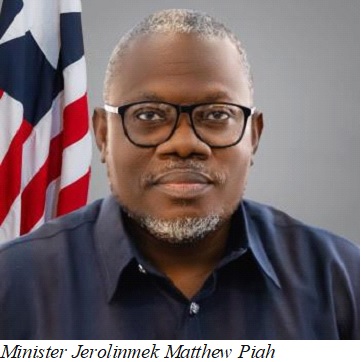MONROVIA – The Press Union of Liberia (PUL) Specialized Committee of Enquiry, comprising veteran journalist and media development specialist Mrs. Torwon Sulonteh-Brown, Attorney-at-Law Bruce S. B. Boweh, Sr., and human rights activist Adama Kiatamba Dempster, National Secretary General of the Civil Society Human Rights Advocacy Platform of Liberia, has released its human rights activist member’s findings and recommendations on the incident involving journalist D. Franklin Doloquee and Information Minister Jerolinmek Matthew Piah.
The incident occurred on September 13, 2025, while Doloquee was attending a government town hall forum in Sanniquellie, Nimba County. Minister Piah allegedly seized Doloquee’s mobile phone during an interview, deleted photos and video recordings, and did not return the device.
The Committee’s investigation found that Minister Piah’s actions in seizing the phone and deleting unauthorized contents were inappropriate and exceeded his authority.
The Committee also determined that journalist Doloquee’s recording of video without prior consent from the minister violates journalistic ethics.
The Committee further found that FrontPageAfrica and some media outlets published the story without giving the minister “journalistic due process,” violating Article 27 of the PUL’s Code of Conduct. Both Minister Piah and journalist Doloquee’s employers failed to follow established protocols in addressing the matter.
Given the nature of the incident toward the promotion and protection of press freedom globally, the Committee said it drew insight from laws and policies to inform its investigation, placing specific emphasis on equal protection of the law, as contained in Charter III Article 11 (c) of the 1986 Constitution of Liberia, under Fundamental Rights.
The provision states: “All persons are equal before the law and are therefore entitled to equal protection of the law.”
The Code of Ethics for Liberian Journalists, Article 3, Fairness and Accuracy, Section 3.2 states, the journalist shall use only fair methods to obtain news, photographs and documents; Article 6, section 6.5 states, the journalist shall respect the principle of presumption of innocence. But this shall not prevent him/her from fairly reporting on matters before a court – including the public.
Articles 19, 23, 27, 29 and Paragraph 2 of the PUL Code of Conduct, Chapter 15 of the 1986 Constitution, and Chapter 12.70 of Liberia’s Penal Law were also referenced.
Pursuant to the above, the Specialized Committee of Enquiry commissioned an independent investigation, engaging both the minister, Jerolinmek Piah, and the journalist, Franklin Duologue as well as witnesses to the incident.
The committee observed the following: The incident occurred at night, which should have made the unauthorized video recording more conspicuous. This means that Doloquee did not start videotaping at the beginning of the interview; Doloquee did not adhere to the agreed-upon protocol of audio-only recording in violation of Article 27 of the PUL Code of Conduct and the Minister acted beyond his authority by personally deleting and further demanding the deletion of content without following proper legal or institutional procedures.
His act violates Article 15 of the 1986 Constitution on free press and Title 26 Chapter 12.70 of the Penal Law under official oppression or misuse of power/office, the Committee said.
According to the committee, both OK FM and FrontPageAfrica responded swiftly but failed to consult the PUL before issuing statements of condemnation. Furthermore, FrontPageAfrica did not accord the Minister the right to reply or the chance to respond in line with Article 19 of the PUL Code of Conduct.
“The complaint by Doloquee did not specify assault but described verbal intimidation and seizure of the phone,” the committee further indicated.
Recommendations proffered include that the PUL reinforce adherence to the Journalists’ Code of Ethics, media houses seek the PUL’s intervention before taking action in conflicts with individuals, groups, or government officials, and government officials respect journalists’ rights and follow due process.
The Committee also recommends that the PUL, media houses, and government agencies organize joint trainings on ethics, rights, and responsibilities, and that the PUL and the Ministry of Information engage in dialogue to foster mutual understanding.
Mrs. Torwon Sulonteh-Brown, Committee Chairperson, stated that the report underscores the need for clear guidelines on interactions between government officials and journalists to prevent abuse of power, protect press freedom, and promote professionalism.
The PUL Specialized Committee of Enquiry calls on all stakeholders to respect the principles of press freedom, journalistic ethics, and professionalism.

Comments are closed.